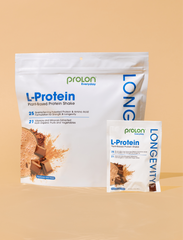
The Longevity Diet: Heart Health Starts With What Is (and Isn’t) on Your Plate
Heart disease remains the leading cause of death worldwide, but with the right lifestyle interventions, its risk can be significantly reduced. Inspired by the eating habits of people in regions with the highest concentrations of centenarians, The Longevity Diet offers a wealth of benefits—including improved heart health.
This National Heart Health Month, we’re exploring how adopting the principles of The Longevity Diet may help protect your heart and support lasting cardiovascular well-being. From plant-based and nutrient-rich foods to periodic fasting, discover how these time-tested strategies can make a difference in your health for years to come.
Here are some of the ways Longevity Diet principles can support your heart:
-
Fiber-Rich Carbohydrates (55-65% of daily food intake) and Healthy Fats (35% of daily food intake)
The Longevity Diet emphasizes healthy fats such as olive oil, nuts, and seeds, along with fiber-rich carbohydrates from whole grains and legumes. These foods help support healthy cholesterol levels and stabilize blood sugar, which can reduce the risk of both heart disease and type 2 diabetes. Healthy fats, particularly monounsaturated fats, help lower LDL cholesterol (often referred to as "bad" cholesterol) while increasing HDL cholesterol (the "good" kind), potentially contributing to a healthier heart.
-
Balanced, Mostly Vegan Protein Intake (10-11% of daily intake)
Consuming excessive protein, particularly from animal sources, can raise IGF-1 levels—a growth hormone associated with accelerated aging. Animal proteins are rich in specific amino acids that can overstimulate IGF-1, whereas plant-based proteins are less likely to trigger this response. The Longevity Diet therefore emphasizes plant-based protein consumption to support lean muscle mass and slow the rate of cellular aging—which are important for both heart and metabolic health. Limiting animal products also reduces the intake of saturated fats, which may help reduce LDL cholesterol and minimize the risk of atherosclerosis.
Including fish in moderation—2-3 times per week, especially fatty fish like salmon or mackerel—adds heart-healthy omega-3 fatty acids which can help lower triglycerides and enhance arterial flexibility. For individuals over 65 experiencing muscle, strength, or weight loss, increasing protein from sources such as fish, eggs, cheese, and yogurt made from sheep’s or goat’s milk is recommended.
-
Antioxidant-Rich, Plant-Based Foods
Plant-based foods rich in antioxidants, such as fruits, vegetables, legumes, and whole grains, may help combat oxidative stress and inflammation, two major contributors to heart disease. Additionally, antioxidants support vascular health by improving blood vessel function, which is essential for optimal heart health and circulation, and potassium-rich foods like leafy greens and legumes may help lower blood pressure by counteracting the harmful effects of sodium.
-
Limit Alcohol and Processed Foods
Ultra-processed foods, which are typically high in sodium, added sugars, and trans fats, can contribute to increased inflammation, elevated blood pressure, and worsened cholesterol profiles; limiting these foods is essential for supporting heart health and reducing cardiovascular risks. Similarly, moderating alcohol intake is crucial, as excessive consumption is associated with hypertension, arrhythmias, and cardiomyopathy, which can strain the cardiovascular system and elevate the risk of heart disease.
-
Daily Exercise and Movement
Daily walking and moderate exercise improve cardiovascular health by enhancing circulation, lowering blood pressure, and reducing the risk of heart disease. Consistent movement also supports weight management and metabolic function, which are key factors in heart health. This principle is central to The Longevity Diet, which highlights movement, especially walking, as part of a healthy lifestyle.
Prolonged Fasting and Heart Health
A cornerstone of The Longevity Diet is periodic, prolonged fasting. Research highlights the Fasting Mimicking Diet (FMD), when used as part of a comprehensive program, has the potential to support heart health. In fact, studies show that just 20 days of FMD is as effective as 120 days of the Mediterranean Diet on supporting heart health markers and promoting weight loss.
Further research suggests that when followed for three consecutive months and under the guidance of dietitians, the FMD can:
-
Support Healthy Metabolic Markers: Three consecutive monthly cycles have shown support for healthy cardiometabolic markers, specifically when followed under the guidance of medical professionals.
-
Target Fat loss with Protected Muscle Mass: Unlike many traditional weight loss diets that result in the loss of both fat and muscle, FMD helps protect lean muscle mass while promoting fat loss. This is essential for maintaining metabolic efficiency and overall cardiometabolic health.
- Reduce Biological Age: Clinical data suggest that three consecutive monthly cycles of FMD can lower biological age by an average of 2.5 years.
Whether through nutrient-rich plant-based meals, heart-healthy fats, or the power of periodic fasting, these time-tested strategies may offer you a practical roadmap to supporting heart health and a longer, healthier life.
For those struggling with cardiometabolic challenges including prediabetes, or type 2 diabetes, L-Nutra Health, our medical division, can help. Its non-invasive, comprehensive lifestyle medicine programs combine individualized coaching, medical oversight, Longevity Diet principles, and low-glycemic FMD cycles to potentially help you break free from complete reliance on medications, weight plateaus, and rising blood sugar—without drastic lifestyle changes. Learn more here.
Sources:
- Health.Harvard.edu: Can eating potassium-rich foods lower my blood pressure?
- Healh.Harvard.edu: The worst ultra-processed foods for your heart
-
Health.Harvard.edu: Vegetarian and vegan diets may lower cholesterol levels
- Heart.org: Eating a plant-based diet at any age may lower cardiovascular risk
- Heart.org: Monosaturated Fats
- Mayoclinic.org: Healthy Eating - Whole Grains
- Mayoclinic.org: Omega-3 in fish: How eating fish helps your heart
-
NIH.gov: How dietary factors influence disease risk
- NIH.gov: Protein Consumption Linked to Longevity
- World-heart-federation.org: The impact of alcohol consumption on cardiovascular health













